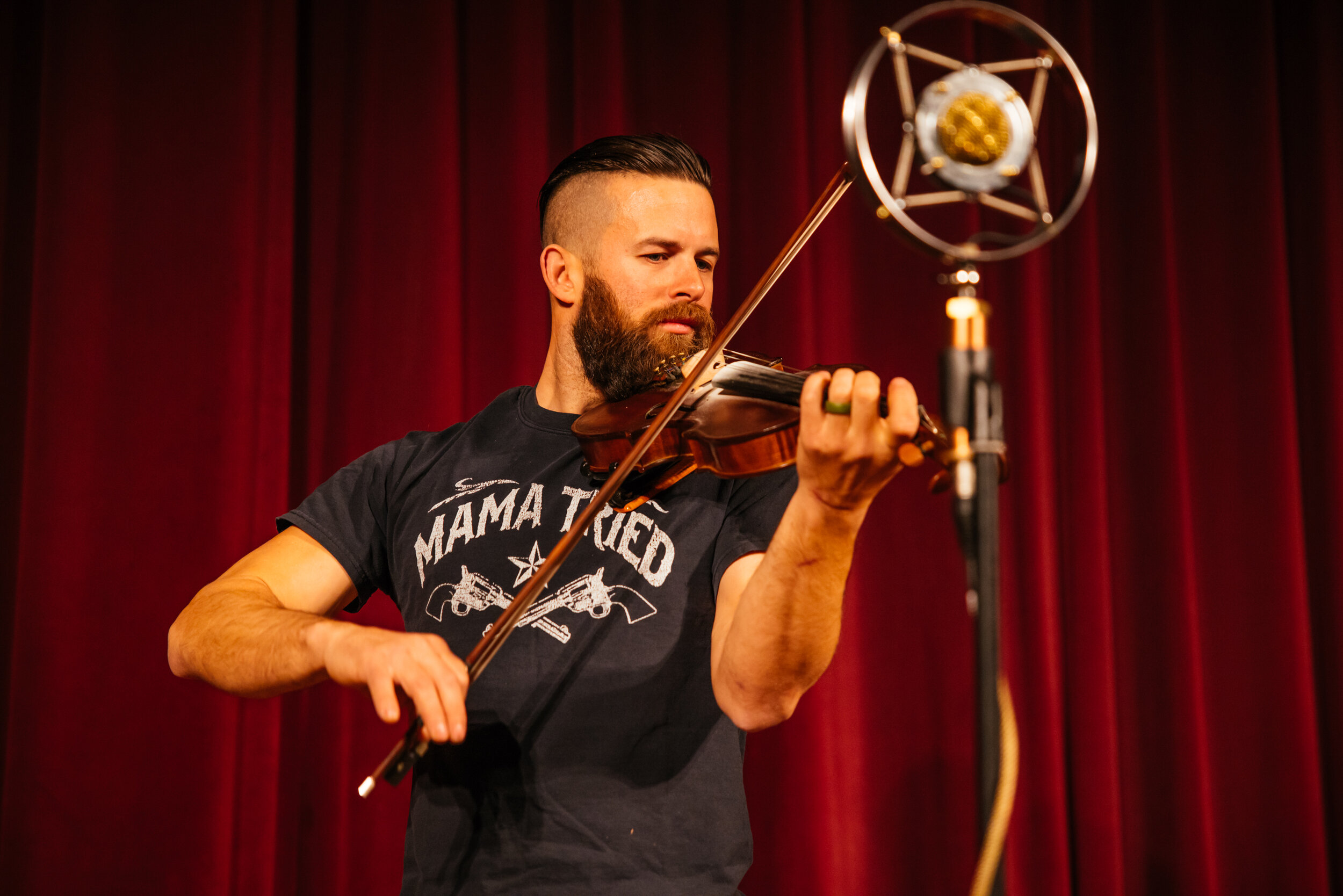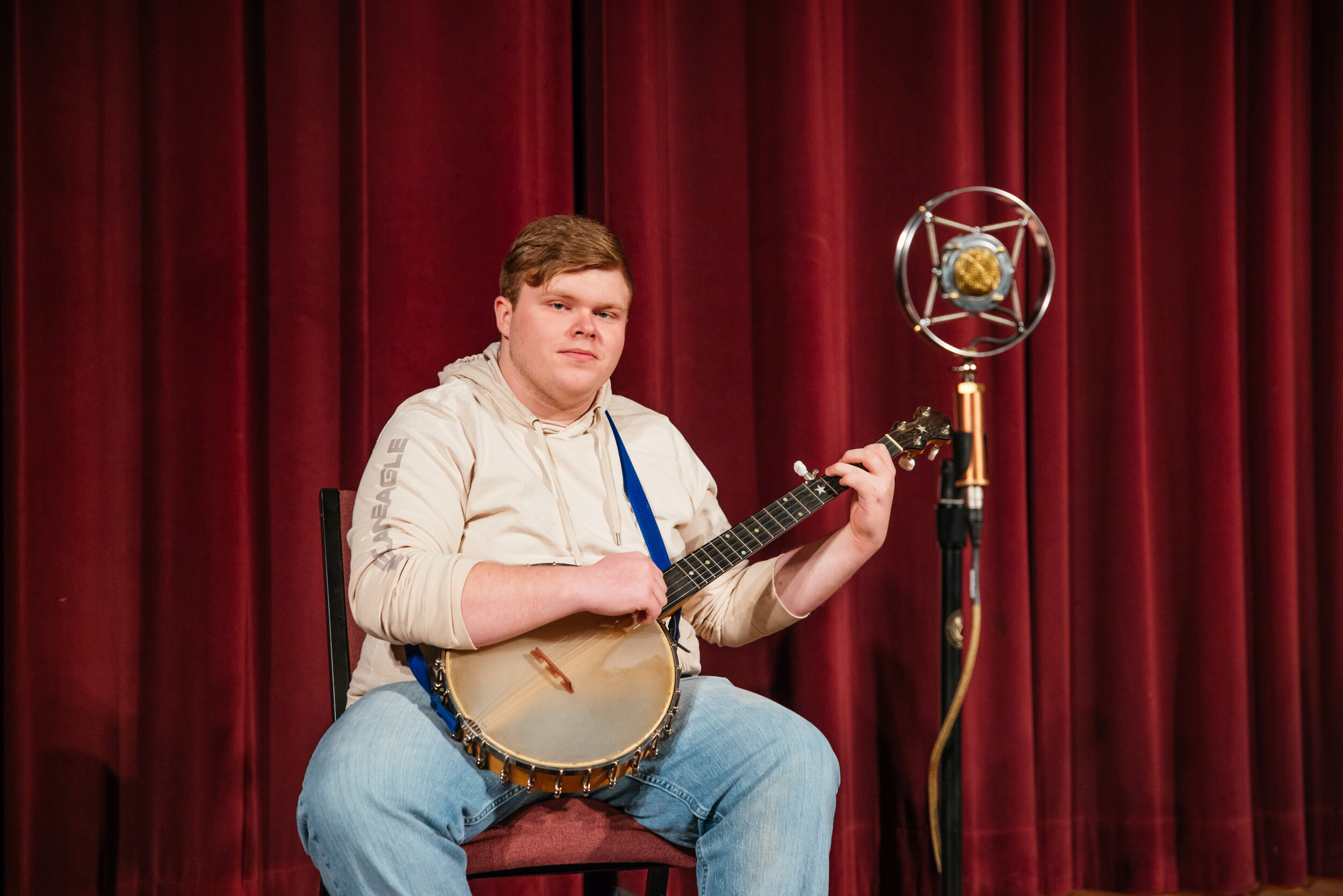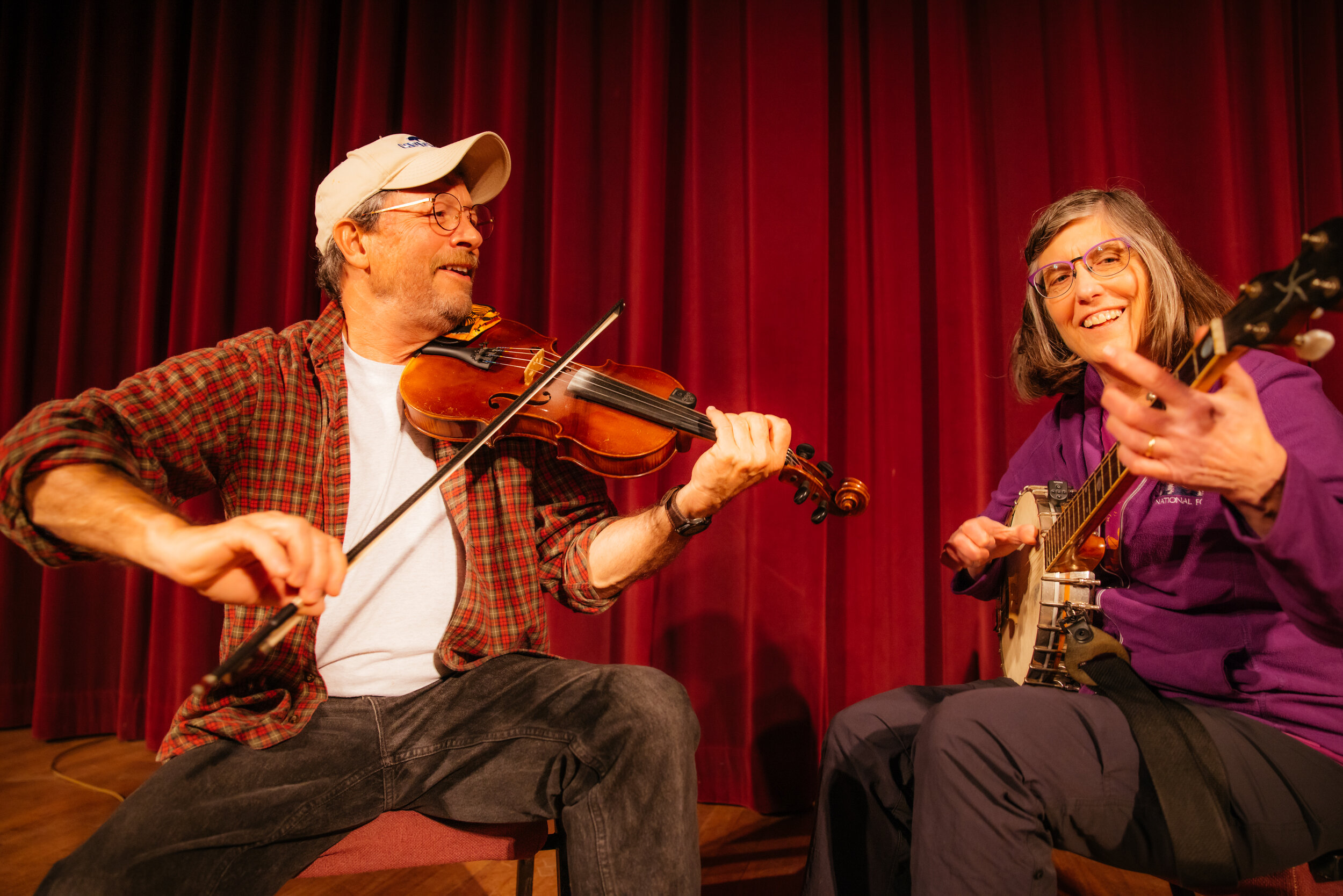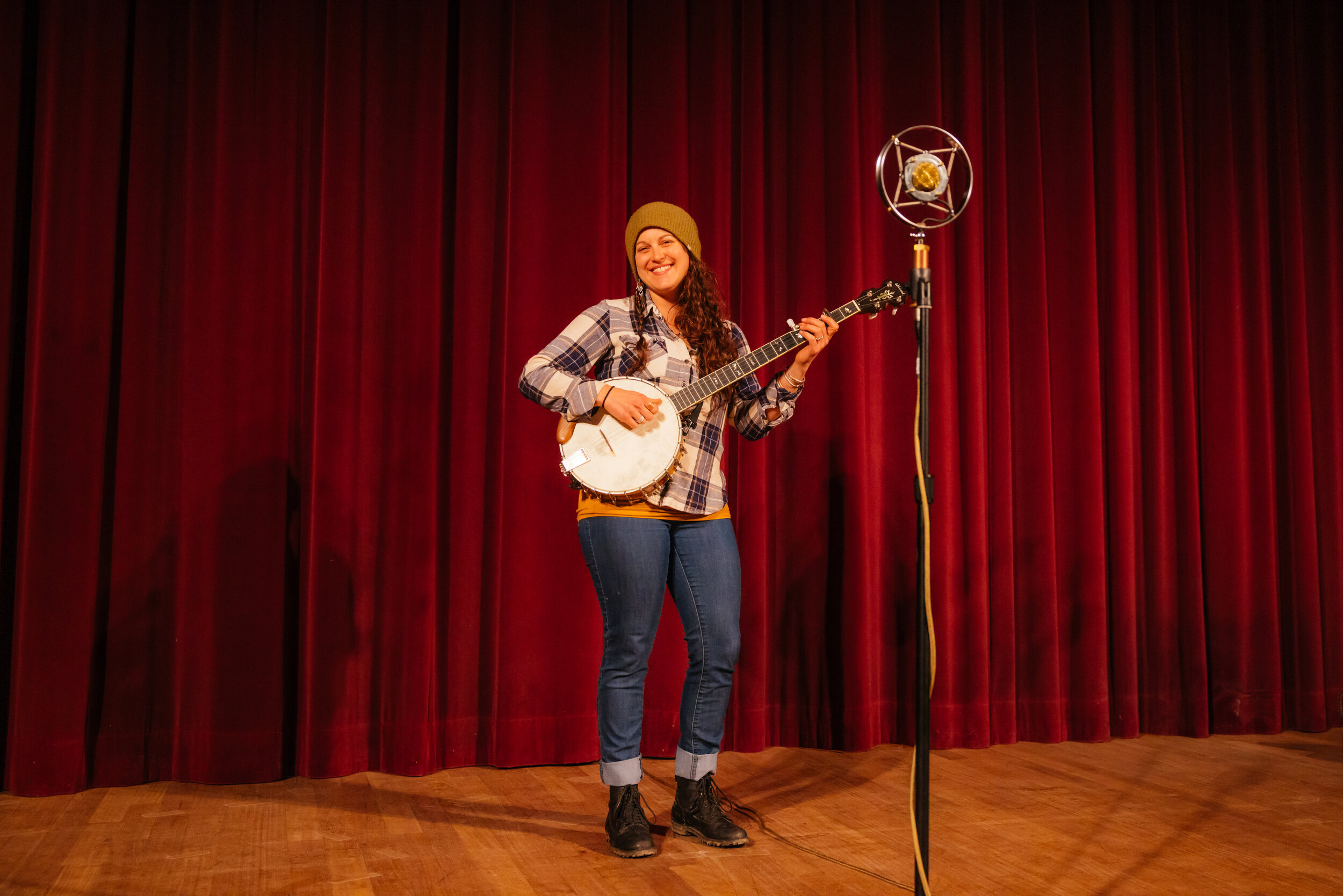The Story Session Artists
Welcome to the artist spotlight on the Opera House Story Sessions, where we proudly showcase the exceptional talent and inspiring stories of our featured local musician. Discover the captivating stories and incredible talent featured in our podcast, audio, and video series, available on all major platforms. Delve into the mesmerizing world of this remarkable artist, as they enchant us with their unique blend of bluegrass and old-time music. Join us as we celebrate and explore the lives and personalities of these remarkable artists, through high-quality performances and engaging discussions. Learn about the inspirations, personal experiences, and intricate artistic processes that have culminated in the unforgettable sound of our esteemed guest. Immerse yourself in the rich tapestry of their musical narrative as we honor the vibrant, diverse voices that contribute to our local music scene.
Richard Hefner
Richard Hefner sits on stage with his banjo during the Pocahontas County Opera House Story Sessions, playing music and entertaining the audience of only a few with his skillful plucking and lively tunes.
Richard Hefner is a founding member of the Black Mountain Bluegrass Boys, West Virginia’s longest-running bluegrass band. Hefner’s traditional bluegrass banjo playing and tenor vocals have contributed both continuity and much of the “high lonesome” sound for which the band has become so well-known. He has displayed his banjo skills many times as a victor in contests and at the Vandalia Festival.
The group first organized in 1968 around the foursome of Richard Hefner (banjo/tenor vocal), his brother Bill Hefner (guitar/mandolin/baritone vocal), their late uncle Glenn “Dude” Irvine (mandolin), and the late Harley Carpenter (guitar/lead vocal). They took their name from Black Mountain in their native Pocahontas County. For five years the group worked a weekly radio show on WVAR, in Richwood. They also made regular appearances at local events and regional bluegrass festivals. They recorded their first album in January 1971, “Pure Old Bluegrass”, and in the mid-1970s they followed up with a pair of albums: “Million Lonely Days” and “Talk of the County.” More recent albums include “Black Mountain Bluegrass Boys 1968-1973,” “Live at Midnight,” “Live at The Opera House,” and “Live at Greenbrier Valley Theatre.”
Richard currently lives with his wife Maddy in Renick and often hosts informal music jams with some of the best musicians in the region at his home place in Mill Point.
Jake Krack
Jake Krack is an exceptional fiddler within the old-time tradition. Most often performing with The Bing Brothers, Jake has won multiple awards and fiddling competitions across Appalachia. From early childhood, Jake was mentored by many legendary fiddlers including Melvin Wine. The remarkable relationship between Melvin and Jake is beautifully captured in the children’s book Passing the Music Down. Jake was also the subject of the 2018 feature-length documentary Fiddlin’.
Jake and The Bing Brothers were the final performance of The Pocahontas County Opera House in March of 2020. This performance was held in conjunction with a screening of Fiddlin’. Jake lives in Marlinton with his wife Katie and daughter Iris.
Trevor Hammons
Trevor Hammons, a talented young musician from Marlinton, West Virginia, belongs to the esteemed Hammons Family of Williams River. This family boasts a rich history, with eight generations of skilled old-time musicians to their name. As the great-grandson of musician Lee Hammons, Trevor is passionately committed to preserving and promoting the family's musical traditions, focusing on banjo and fiddle playing.
Starting his musical journey at the age of eight with the guidance of Pam Lund of Woodrow, Trevor has honed his skills through the years. Along the way, he has had the privilege of learning from accomplished musicians, such as Dave Bing, Henry Barnes, John Blissard, Tim Bing, Ron Mullennex, and Dwight Diller. His hard work and dedication have earned him numerous awards in various categories for his exceptional banjo and fiddle playing.
As a musician, Trevor stresses the importance of not only preserving the stories and history of old-time music but also sharing them with a broader audience. To that end, he has developed a captivating show that highlights his family's legacy and underscores the significance of their musical tradition. Trevor has mastered the Appalachian Old-Time technique on the banjo, skillfully evoking the eerie and haunting style performed by his great-grandfather Lee Hammons and musicians of that era.
Trevor's performances serve as an opportunity for audiences to immerse themselves in the timeless beauty of old-time music. Through his shows, he not only showcases his impressive musical skills but also provides a deeper understanding of the historical and cultural context that shaped these traditions. The series featuring his musical journey and the tunes he has learned along the way stand as a testament to the enduring appeal of the Hammons Family's musical heritage and the power of traditional music to connect generations.
By engaging with the past and sharing it with contemporary audiences, Trevor plays an essential role in ensuring that the rich history and traditions of old-time music continue to resonate and inspire future generations.
Mike & Mary Sue Burns
Mike and Mary Sue Burns Mike’s first foray into Old-Time music was as a spoons player in the West Virginia University Forestry Club jug band. He soon moved on to guitar. The Forestry Club led him to Elkins for the Forest Festival where he heard Dwight Diller play in the banjo contest. It was the first time that Mike heard the clawhammer style of banjo playing and he instantly knew that was what he wanted to play. Back in Morgantown, Mike found Ron Mullenax and Jack Ramsey (who became his banjo mentor). Both Mike and Mary Sue were inspired by the Highwoods Stringband. Highwoods was touring the college circuit. The Highwoods sound was energetic and hard-driving. Mary Sue heard them at an Oberlin College Folk Music Club concert and immediately borrowed a banjo and begged fellow Oberlin students, Dave Winston and Brad Leftwich to show her a few tunes. Mike heard Highwoods at WVU around the same time and credits Highwoods fiddler, Walt Koken, as a major influence.
Travelling to many old-time festivals held throughout WV, afforded Mike the opportunity to meet Melvin Wine, Glen and Delano Smith, Wilson Douglas, Woody Simmons, Carlos Dalton, Mose Coffman, and Sherman, Burl, Maggie, and Mr. Lee Hammons. In following years, he visited these folks at their homes and couldn’t get enough of their music and stories. At a festival held at Pipestem State Park in WV, Mike heard Odell McGuire, Scott Nelson, Andy Williams, Brad Leftwich, Al Tharp, and David Winston playing some great, hard driving old time that reminded him of the Highwoods sound. Mike says, “I was now hooked on their brand of music. I followed the music to Lexington, Virginia for the 1975-76 Breaking up Christmas parties. Odell McGuire invited me to stay and I did.” During his time in Lexington, Mike met and became friends with Bruce Molsky, Chad Crum, James Leva, Steve Seal, and so many others. He started playing the fiddle after Odell McGuire told him there were too many banjo players in Lexington. He claims that he still plays the fiddle like a banjo: less notes and lots of rhythm.
Mike and Mary Sue met playing in a music session at “Breaking Up Christmas” in Lexington. Mike eventually got a “real Job” as a forester in central West Virginia and once again hooked up with Melvin Wine and Wilson Douglas with whom he played at several of the early Vandalia Gatherings. By 1980, Mike and Mary Sue had settled in Pocahontas County, both with teaching jobs. For an extended time, jobs, kids, and school activities distracted them from serious music playing.
Encouragement from musician friends, especially Jay Lockman and Norris Long, and, in Mike’s case, the desire to prove wrong his doctor’s hopeless pronouncement about the recovery of a broken finger, propelled them back into the music. Their band, “Juanita Fireball and the Continental Drifters” debuted at the Pocahontas County Opera House in 2008 and has been playing ever since. Additionally, Mike and Mary Sue have joined other friends to play Blacksburg Square Dances and the Floyd Country Store. They recently participated in a recording project titled “Dolly & the Devil Festival Season” with musician friends from North Carolina and Virginia.
Kelsey Beverage
Kelsey is a dedicated advocate for the preservation and celebration of old-time music, ensuring that this timeless art form continues to flourish. Hailing from Pocahontas County, she spent her childhood on her family's generational farm in Clover Lick, where arts, music, and crafts have been deeply ingrained in her family's traditions for generations.
From a young age, Kelsey eagerly embraced her musical heritage, taking banjo lessons from Pam Lund. Pam imparted a wealth of knowledge to Kelsey, teaching her numerous songs that now feature prominently in Kelsey's story sessions. When she isn't showcasing her banjo prowess, Kelsey can be found engaging in various outdoor activities that embody the spirit of her home state. During the winter months, she can be seen carving through fresh powder on the ski slopes of Snowshoe, while in warmer weather, she enjoys floating down the river at Ace Adventures.
In all aspects of her life, Kelsey exemplifies West Virginia's motto, "Wild and Wonderful." By staying true to her roots and sharing her passion for traditional music, she fosters an appreciation for the rich cultural history of her region and keeps the spirit of old-time music alive and thriving for future generations.
Story Sessions Video - Click to View
Homer Hunter
Homer Hunter was born and raised in the heart of Appalachia, where he was exposed to a rich musical heritage early in life. Despite growing up in a musical family, it wasn't until Homer reached his 30s that he began to fully embrace his passion for singing and playing music.
Raised by a mother who was deeply involved in the church and a father who turned his life around after being saved at a tent revival, Homer witnessed the transformative power of faith from an early age. His father went from a rough, moonshining man to a devoted preacher, an experience that would later inspire Homer's brother, Hansel, to write the heartfelt song, "My Daddy Did His Job for the Lord."
Homer's life has been marked by a series of fortuitous events, beginning with his time in the Marine Corps. During his service, he was assigned to non-combat roles, avoiding the dangers of the battlefield. After the military, Homer landed a steady job at the DuPont chemical factory in Charleston, West Virginia, thanks to a connection from a fellow serviceman.
It was at DuPont's Hunting and Fishing Club where Homer finally found his voice. He met a group of musicians who needed a singer, and they helped him hone his craft. Together, they formed the Flat Top Pickers, a band that would go on to perform at various venues, including a show for thousands of people at Western University's Coliseum.
Throughout his life, Homer remained dedicated to hard work and treating people with honesty and respect. During his time in Vietnam, he even helped organize a laundry service for local villagers, providing much-needed resources to a struggling community. This act of kindness became one of the proudest moments of his life.
Homer's dedication to music eventually led him to Allegheny Echoes, an old-time and bluegrass music camp in Pocahontas County. There, he connected with musicians like Jack Bowman, Calvin Warner, and Richard Hefner, who would further inspire and influence his music.
Homer Hunter's life is a testament to the power of music, faith, and treating others with kindness. His musical journey may have started late, but his story serves as a reminder that it's never too late to embrace one's passions and make a positive impact on the world.
Dave Bing
Dave Bing is a renowned old-time fiddler who has learned from some of the most influential fiddlers in West Virginia. He was introduced to music at a young age, learning from his father's childhood friend George Steele, who had moved to Phoenix and made his living playing on the radio and at square dances. From Steele, Bing learned the basic shuffle and Georgia bow, which helped him develop his own style of fiddling.
Bing also learned from Frank George, his neighbor in Roane County, who was not only a great fiddler but also an intelligent and sharp-minded individual. Bing was captivated by George's relaxed style of playing and how he would bring out his fiddle, which would still sound sweet despite not being played for some time.
Bing's musical education expanded when he met the Hammons Family, particularly Sherman Hammons, whom he first met as a child. It wasn't until Bing's father stumbled upon a banjo case at Sherman's house that he learned about the family's musical talent. Bing was immediately drawn to the archaic, old-time fiddle tunes that Sherman played and spent a month recording the family and learning their tunes.
As Bing got older, he started traveling around the state and meeting more fiddlers, such as Melvin Wine and Ernie Carpenter. He was introduced to the circuit of old-time music festivals and learned the variations of songs from central West Virginia fiddlers.
Bing's unique style of fiddling combines the influences of the fiddlers he learned from, including Steele, George, the Hammons Family, and many others. He continues to play and perform, sharing his passion for old-time music with audiences all over the state.
Mike Bing
Mike Bing, a master of the mandolin and an influential figure in the world of old-time and bluegrass music, has made Pocahontas County his home, a region known for its rich musical heritage. Although he wasn't born in the county, Mike spent significant time there growing up, fishing on the Williams River and absorbing the local musical culture.
As the co-founder of Allegheny Echoes, a celebration of traditional music and its Appalachian roots, Mike has dedicated his life to sharing the enchanting sounds of the past with new generations of music lovers.
Together with his brothers, Tim and Dave, Mike forms the backbone of the acclaimed band, The Bing Brothers. Known for their powerful performances and captivating stage presence, the trio has traveled the world, enthralling audiences with their captivating renditions of old-time and bluegrass tunes. The band is also known for its signature "Bing Speed," a high-energy, fast-paced playing style that leaves listeners in awe.
Despite their reputation for "Bing Speed," Mike has a deep appreciation for slower, more melodic tunes, such as "Big Scioty." He believes these lilting melodies best capture the true essence of traditional music, and he enjoys sharing them with audiences.
Mike's love for traditional music is deeply rooted in the cultural influences that surrounded him during his time spent in Pocahontas County. He was exposed to a wide array of musical styles, including the Irish, English, and Scottish tunes that have left an indelible mark on the region's musical landscape. The Hammons family tunes, a collection of music passed down through generations, have also played a significant role in shaping Mike's unique sound.
As a performer, Mike is known for his dedication to preserving the authenticity of old-time music. He is particularly fond of tunes that evoke a sense of nostalgia, such as the "Arkansas Traveller," which is synonymous with classic Bugs Bunny cartoons.
Throughout his illustrious career, Mike has drawn inspiration from numerous legendary musicians. Byron Berline, who played with bluegrass icon Bill Monroe, and Franklin George, a World War II veteran who introduced Scottish tunes to his band, Big Possum String Band, are just two examples of the many artists who have left a lasting impact on Mike's music.
Mike's commitment to sharing and celebrating old-time and bluegrass music extends beyond his performances with The Bing Brothers. As part of the Pocahontas County Opera House Story Sessions series, he continues to captivate audiences by sharing the stories and memories that are woven into the fabric of each tune he performs. Through his passion, talent, and dedication, Mike Bing is preserving a treasured piece of America's musical heritage and ensuring that it continues to resonate with music lovers for generations to come.
Dwight Diller
Dwight Diller, born on August 17, 1946, in Rand, West Virginia, was a prominent figure in the preservation and sharing of the rich cultural heritage of the Appalachian Mountains. Raised in Pocahontas County, Dwight found stability and roots in the old people and their mountain music, becoming inspired by fiddler and banjo player Hamp Carpenter. The Hammons family, particularly Lee, Sherman, Maggie, and Burl, further captivated him with their storytelling and musical talent, which he documented through photos and recordings.
During the 1970s folk revival, Dwight played at virtually every fair and festival in West Virginia. His energetic and hard-driving style left a lasting impression on fellow musicians and fans alike. He recorded 15 albums, appeared in the feature film Fifth String with John Morris, and performed on the Mountain Stage radio program.
In addition to his musical talents, Dwight experienced a religious conversion in the 1970s and became an ordained minister. He believed his calling was to minister through teaching banjo, and he went on to teach at the Augusta Heritage Center in Elkins, the Allegheny Echoes traditional music camp, and other locations across the United States, Canada, and England.
Dwight's dedication to preserving and sharing the cultural heritage of West Virginia earned him numerous accolades, including the Mountaineer Heritage Award from West Virginia University and the Vandalia Award, the state's highest folklife honor. Dwight passed away on February 14, 2023, but his legacy lives on through the countless musicians he inspired and the preservation of the Hammons style of music and storytelling.
Dwight Diller's life serves as a testament to the importance of preserving and sharing the stories and traditions of our past. His wisdom about music and life converged in nearly every story he told, emphasizing the importance of allowing one's own individual pulse to drive their music, much like the rhythm of a powerful mountain stream. His passion and dedication will continue to inspire future generations to discover and appreciate the rich legacy of the Appalachian Mountains.









